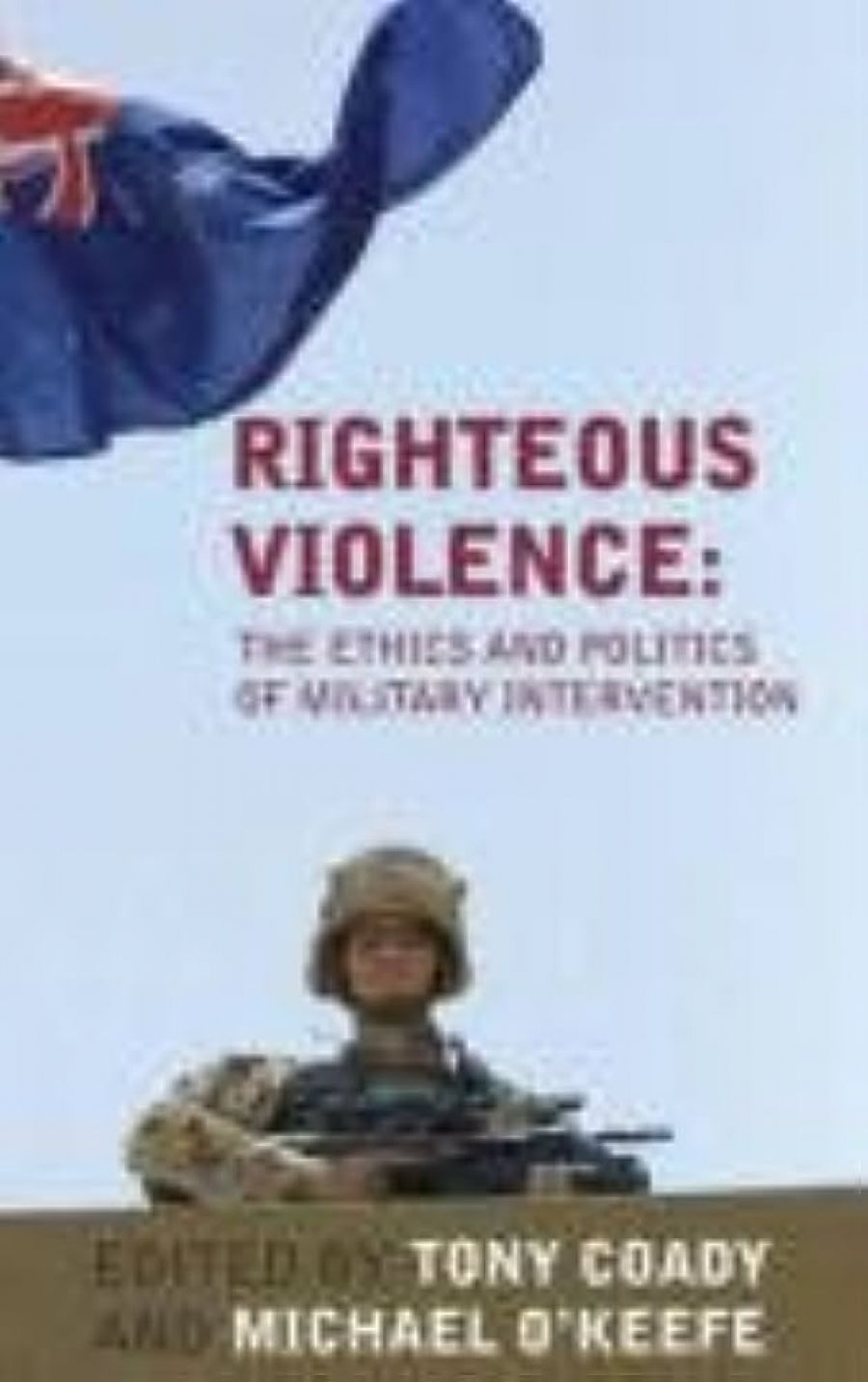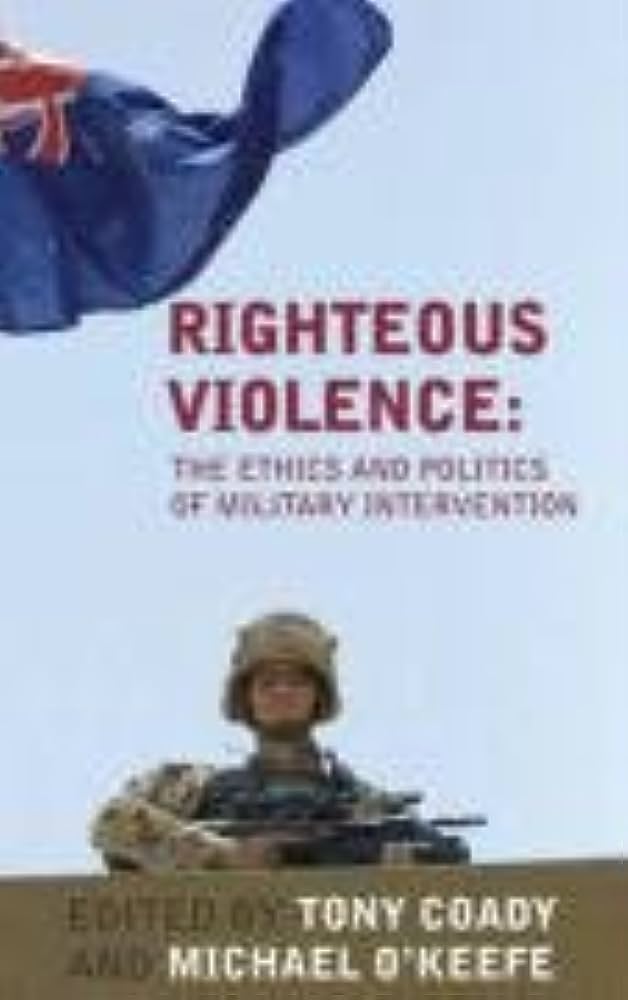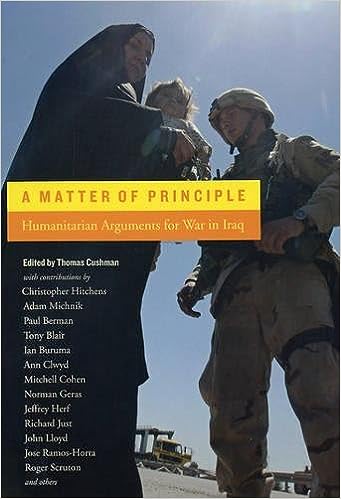
- Free Article: No
- Contents Category: War
- Review Article: Yes
- Article Title: Yet this is what war is
- Online Only: No
- Custom Highlight Text:
The fears and tensions in the aftermath of September 11 created an unusual political climate in the US, in which it became possible for the government to lead an invasion without having to explain precisely why. Nobody seemed to quite know who or what was guiding the administration as it led the charge for war: was it utopian neo-conservatives trying to reshape the world in America’s image? Was it isolationist hawks trying to wipe out an old foreign foe? Was it oil-hungry Texans? Was it paranoid security advisers, regretful of their failures and with a new bent for pre-emption, no matter how distant the threat?
- Book 1 Title: Righteous Violence
- Book 1 Subtitle: The Ethics and Politics of Military Intervention
- Book 1 Biblio: MUP, $34.95 pb, 238 pp
- Book 1 Cover Small (400 x 600):

- Book 2 Title: A Matter of Principle
- Book 2 Subtitle: Humanitarian Arguments for War In Iraq
- Book 2 Biblio: University of California Press, $44.95 pb, 320 pp
- Book 2 Cover Small (400 x 600):

Back to late 2002 and, from within that mixed bundle of messages that the US-led coalition proffered as justification for the invasion of Iraq, two stood out: there was the threat that potential Iraqi WMDs posed to the West, and the threat that Saddam posed to his own people. For those who supported the war as a form of pre-emptive self-defence, the latter threat was used primarily to bolster the former. So, for instance, Saddam’s use of chemical weapons against his own people was seen as evidence of his propensity to use such weapons, if he had them, against his foreign enemies. But relying on the sheer brutality of Saddam was unlikely to provide, on its own, just grounds for war. Instead, during the lead-up, the political leaders of the US and its allies generally stressed the self-defence argument, as they tried to convince other states and the UN of the war’s rightness. A week before the war in March 2003, Prime Minister John Howard said at the National Press Club:
If Iraq had genuinely disarmed, I couldn’t justify on its own a military invasion of Iraq to change the régime. I’ve never advocated that, much in all as I despise the régime. But … I get a bit tired of the humanitarian argument all being on the one side. It’s about time that the humanitarian argument was put into a better balance and people understand what a monstrous régime we are dealing with.
Howard was criticising opponents of the war for failing to concede the benefits that Saddam’s removal would have for the people they were purporting to defend. Even for Howard, régime change was not the object of the war but a welcome prize. The object was to remove the threat of Saddam’s weapons. Since then, the self-defence argument has foundered in the absence of WMDs.
It may be, as Christopher Hitchens argues, that Saddam’s régime belonged to ‘a notorious group of nations that sought to obtain illegal weaponry by stealth’. Saddam may have ‘sought’, but, as we now know, he failed. Whether or not there were sound reasons before the war for believing that Saddam had mobile chemical labs or missiles that could reach Europe within forty-five minutes, the self-defence justification has been discredited. The world may or may not be safer without Saddam in power; but we now know the ostensible reason for the war rested on flawed intelligence.
This is partly why the debate – as the publication of these two books attests – has moved on. The political leaders of the coalition governments can defend their decision to go to war by stating that the belief in Saddam’s weapons was prevalent even among their opponents. But, in the absence of WMDs, they are left to emphasise the removal of Saddam and the steps toward democracy as the spoils of war. In October 2004, for instance, after the chief US weapons inspector told Congress that Saddam destroyed his weapons stockpiles in 1991, Howard said, again at the Press Club: ‘I’m not in any way apologetic about the fact that we were involved in a campaign that removed Saddam Hussein. In dealing with the here and now the important challenge is to make sure that Iraq becomes a democratic country.’
Meanwhile, those who supported the war as a humanitarian exploit and gave little or no substance to the threat of WMDs can, in a strange way, claim vindication. So, in A Matter of Principle: Humanitarian Arguments for War in Iraq, journalists, academics, church leaders and political leaders lay out a liberal-left defence of the war and seek to demonstrate that it is possible simultaneously to oppose the policies of George W. Bush and to support the invasion.
Some of the contributors, such as Hitchens, Tony Blair and Jeffrey Herf, continue to advance the dual justification: that the war was necessary to remove both WMDs and a despot. Indeed, the reprinted speech by Blair, delivered in March 2004, continues to subsume Saddam’s brutality within a security-based justification for the war, and seems to run at odds with the book’s humanitarian thesis. In Blair’s view, the spread of democracy should not be pursued for its own sake but because it is likely to create solid and stable international partners. He questions whether international law should continue to desist from intervention unless a régime’s oppression falls within the definition of a humanitarian catastrophe, but only because ‘our own self-interest is ultimately bound up with the fate of other nations’.
The doctrine of ‘international community’, which Blair has been advocating since the NATO-led Kosovo intervention, is not ‘a vision of idealism’ but a practical safeguard in an age of terrorists and WMDs: ‘The best defence of our security lies in the spread of our values,’ he says. In the end, then, Blair is willing to curtail the guarantees of national sovereignty set out in the treaty of Westphalia, but only to further the domestic interests of nation states.
For most of the contributors, however, the spread of democracy – or the forcible removal of sufficiently vicious despots – is a worthy enough cause in itself. The following declaration, by the philosopher Jonathan Rée, fairly sums up the book’s consensus:
I cannot imagine agreeing with Bush’s judgments on many things, and I was quite unpersuaded by the specific claims he made about Iraq: it always seemed unlikely that Saddam’s Baathist régime would have backed Islamicist terrorists or that it could pose any military threat to Europe or the United States … But the important point was not the machinations of the Washington élite or their rich fantasy life (as I said rather sanctimoniously in a discussion at my local Labour Party) but the long-term welfare of the twenty-five million people who live in Iraq.
Rée goes on to express regret for the ‘dark and im-plausible’ case for the war espoused by the allies, which he says distorted the public discussion and focused the debate on the ills of Bush, Blair and their assistants rather than on the opportunities for the Iraqi people. However, as seen from Howard’s and Blair’s comments above, the coalition’s leaders did not believe the humanitarian spoils were a sufficient justification for the war.
All this will do little to convince those who opposed the war, for whom the continued violence in Iraq has already undermined the humanitarian argument (just as the lack of weapons has undermined the self-defence argument). Now that the war has occurred, the humanitarian cost-benefit analysis is a hypothetical question, to which the answer is not a fact but a belief. Opponents of the war will point to the mounting civilian death toll, while supporters point to Saddam’s mass graves and the election turnout. Pamela Bone, a columnist at The Age and the book’s only Australian contributor, supported the invasion and estimates that it probably saved more people than it killed: ‘How can you trade lives off against each other, saying that these lives must be sacrificed to save other lives?’ she asks. ‘Yet this is what war is.’
Of course, few would argue that the removal of Saddam was not a benefit of the war. The question is whether his removal was warranted by an invasion. While some of the contributors to A Matter of Principle admit to doubts about the war as the cost rises, the book does not seek to establish a framework for deciding when, and whether, a humanitarian crisis and the failure of alternative policies warrants the use of force. This is the subject of Righteous Violence: The Ethics and Politics of Military Intervention, a collection of articles by academics and defence strategists on the problems of humanitarian intervention, particularly in Iraq and Kosovo, and on the role of the United Nations.
The contributors essentially oppose the war in Iraq because they believe the use of force was disproportionate to the potential humanitarian benefits. Tony Coady, the book’s co-editor and a professorial fellow in applied philosophy at the University of Melbourne, criticises a tendency towards moralism in US foreign policy, which he says blinded President Bush and his advisers to the anarchy and disruption that would follow the invasion. Coady prefers a realist approach, which would take account of the cultural barriers to intervention in countries such as Iraq and would recognise that there are massacres, plagues and disasters that may be less costly to address.
Frequently, however, the moralist and realist approaches will overlap. As Hugh White points out, the most significant motivation for the Bush administration was a strategic attempt to promote pro-Western régimes in Iraq and the Middle East. This attempt to reshape the world to suit US interests is ‘revolutionary’ and ‘imperialist’, and would, if it became a universal right, result in anarchy. White rejects the application of this doctrine to Iraq but believes there is a case for American exceptionalism when it comes to the use of force. In this, White occupies a relatively rare position among non-American commentators, and it makes his views on Iraq compelling. White is not afraid of American power and believes that the US has overwhelmingly been a force for good in the world; but he also believes a confluence of events led America’s usually reliable political processes, in the case of Iraq, to a rare and tragically careless mistake. He believes that the enterprise in Iraq was beyond America’s capability – and that this, in itself, invalidates the humanitarian and strategic grounds for war.
The advantage of White’s analysis is that it takes account of law, practice and politics. In contrast, several contributors focus almost exclusively on the tenets of international law to determine the moral legitimacy of intervention. The presumption, stated by a retired Australian army officer, Paul Muggleton, is that unilateralism, other than in self-defence, is dangerous. This leads to the search for international bodies and charters that can be relied on to guide moral multilateral interventions. But this is where these two books – and many minds – tend to diverge: on the facts and rules that need attention. One emphasises the injustice that needed ending; the other emphasises the need to end it justly.


Comments powered by CComment